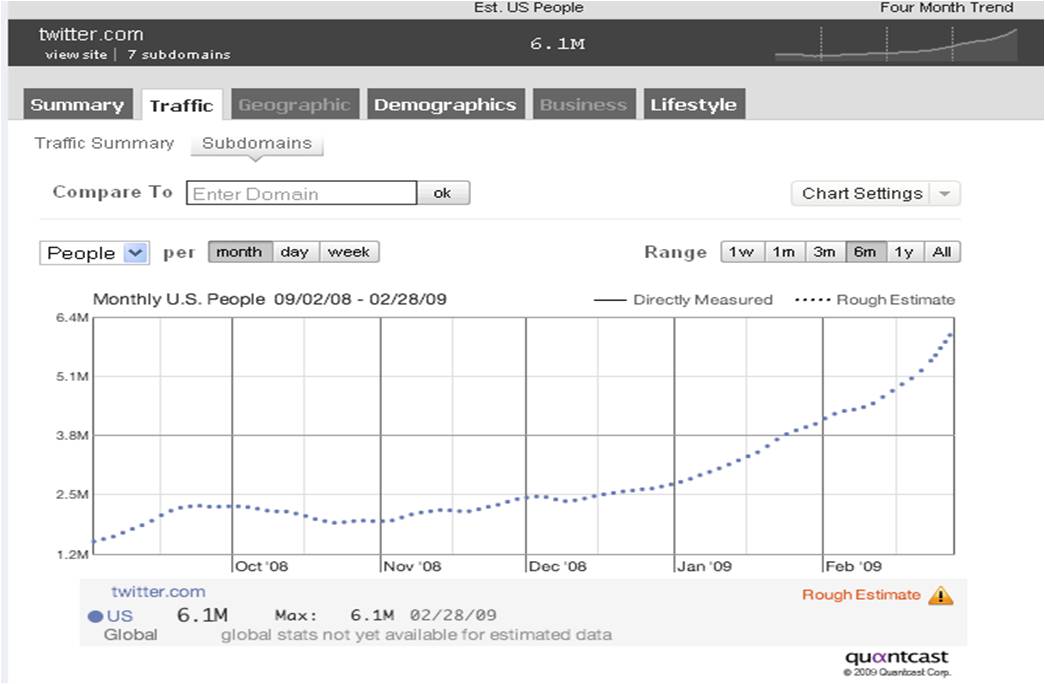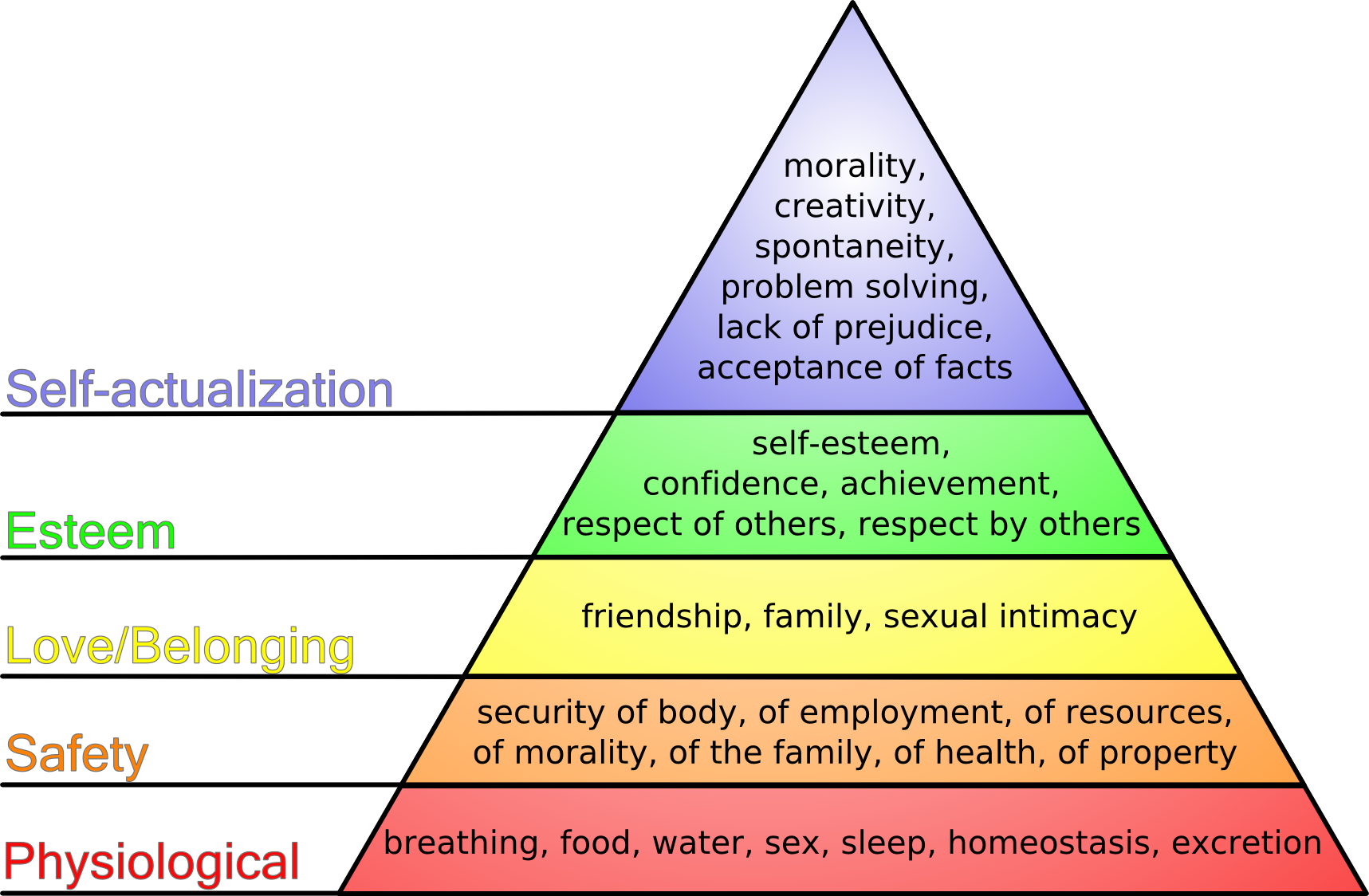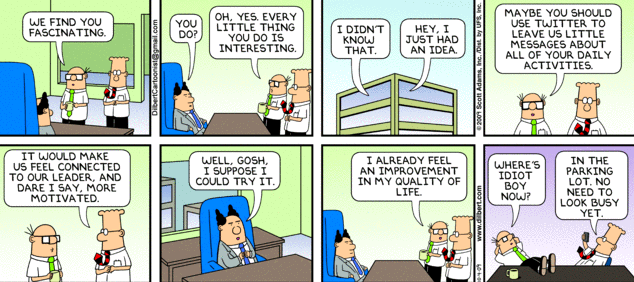Why are we using Twitter anyway?
The last couple of years online communities have been developing applications for users to share daily updates about their life, thoughts and whereabouts. Hyves provides a ‘WieWatWaar’ and Facebook has it’s own ‘Wall’ where users can update their friends. Twitter does it the light-weight way. Twitter is a microblogging website that allows an easy and light-weight form of communication. It enables users to broadcast and share information about their activities, opinions and status. But why are we using Twitter anyway? Is it a tool to nourish our social needs or is technology increasing our needs to keep track of out friends every minute of the day?
Some quick facts about Twitter
Within eight months after launching Twitter – back in April 2007 – it had reached about 94,000 users [1]. Pew Internet & American Life Project stated that:
“As of December 2008 11% of online adults used Twitter or updated their status online… Just a few weeks earlier, in November 2008, 9% of internet users used Twitter or updated their status online and in May of 2008, 6% of internet users responded yes to a slightly different question, where users were asked if they used “Twitter or another ‘microblogging’ service to share updates about themselves or to see updates about others.” [1]
However more recent research has shown that the growth of Twitter is not increasing but rather decreasing. Back in 2008 Twitter had grew with 422%, but research conducted by Hitwise indicates that the rise of Twitter may be decreasing. ‘In September of last year, it was around 0.01%. Then growth skyrocketed to a high of around 0.20% in June 2009. Since then though, it’s been dropping, and is now at 0.17%.’ [2]
Despite the numbers we can not deny it: services like Twitter are booming business. But why do we want to share every minute of the day what we are doing with our online followers? Where does this urge come from to keep in touch with each other every moment of the day?
Our Social Being and Needs
Humans are social beings with social needs. We need each other to grow as well. Rom Harré describes in his book ‘Social Being’ that we exist as persons for ourselves and other people. We exist solely by the virtue of networks of relations in which we stand to other human beings of our kind. We are partially created by other people and our actions and interactions are jointed actions [3]. Twitter in this case would be a platform on which network of relations are enhanced. Networks are created and the followers you have and you follow are people you have shared interest with; they are ‘humans beings of our kind.’
Aristotle on the other hand speaks of how achieving the good life. We all have social needs and to have a good, successful and happy life we need to socialize with others. And because humans are by nature social beings it is good to live in a society in which the social life is mostly based on a community. Social life in a community is a necessity for a human’s complete flourishing as a human being. Another aspect that Aristotle addresses is friendship. This mutual admiration between two human beings is a necessity. This moral admiration for one and another is essential in friendships and taking advantage of these friendships can make a person fully human. [4]
The Maslow’s hierarchy of needs also addresses this fact. After physical and safety needs we all have our social needs. According to Maslow these social needs involve emotionally based relationships such as friendship and intimacy.
Technology enables or increases or needs?
Both Harré and Aristotle seem to agree on the fact that we are social beings that need networks / relationships to become fully human. Twitter seems to enable this need to keep our networks updated on our status; our well-being in other words. Back in the old days we would make time to catch up with our friends and family in a more intimate way. We would gather together with friends to discuss the latest developments. Unfortunately society is speeding up and time is not always on our side.
Applications like Twitter enable us to maintain our social relationships and nourish our social needs on an easy, direct, mobile and faster way. But a question raises: is this a mass medium that only nourish our basic needs or is it meant, like Adorno states, to manipulate the masses into passivity? Is Twitter it in other words enslaving us to keep other updated every moment of the day? Or are our existing social needs nourished by web-based applications like Twitter?
A small empirical research I conducted showed that we have this urge to keep in touch with each other. Respondents stated that they twittered because they wanted to share information, thoughts, simple or bizarre things that happened in daily life. One respondent stated:
‘I love to twitter about personal things that happen in my life, about new media, jokes, pictures, interesting things I come across on the Internet, twitterevents, things that happen in the world and that grab me, songs…’
Maybe I am a little bit skeptical but why would we want to share this kind of personal information on platforms like Twitter? The openness in which quite some people Twitter about there whereabouts is stunning. And all this information is visible to everyone if you don’t have a private account. But why are we posting this information for basically everyone who wants to read it? Are we only nourishing our social needs or is something elso going on?
On the one hand I think that the basic social needs we have to keep each other updated is nourished with the help of Twitter, but at the other hand I keep asking myself where this urge comes from to keep each other updated every moment of the day. Answers could be looked in the sphere of ego boosting for example, but more emperical researched is recommended. Any ideas on specific methodologies for reseach in this field?
—–
Sources:
[1]
Amanda Lenhart, Susannah Fox. ‘Twitter and status updating.’ Pew Internet & American Life Project. February, 2009.
[2]
Ben Parr. ‘STATS: Has Twitter’s Growth Peaked?’ <http://mashable.com/2009/09/25/twitter-traffic-ceiling/>. September 25th, 2009.
[3]
Rom Harré. ‘Social Being.’ 1993
[4]
Edward W. Younkins. ‘Aristotle, human flourishing, and the limited state.’ <http://www.quebecoislibre.org/031122-11.htm>. Montreal, 2003.



